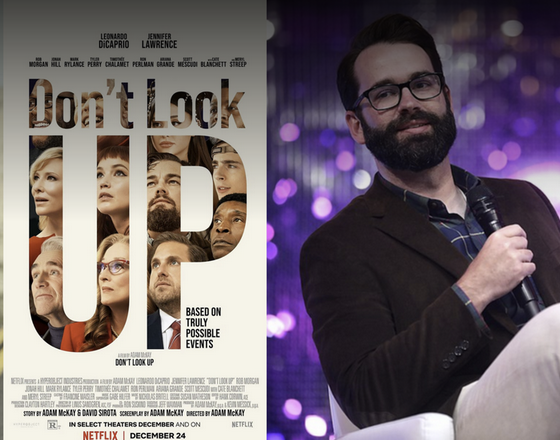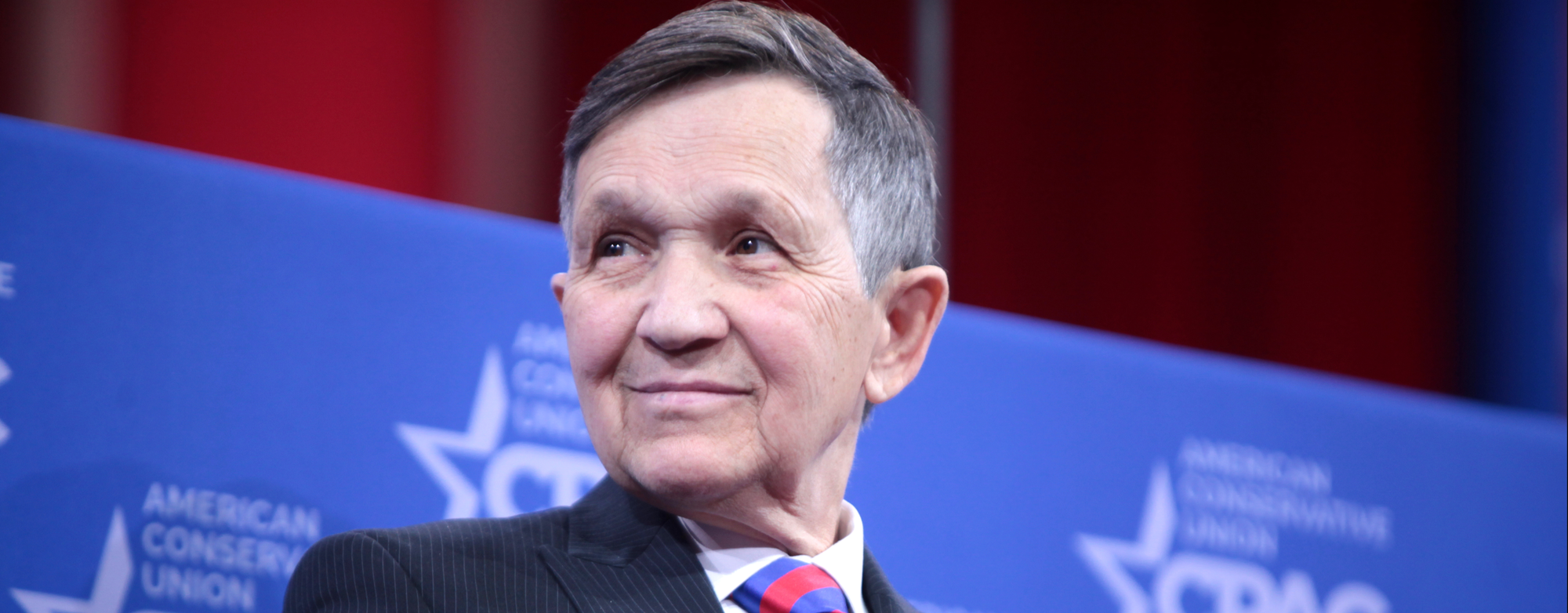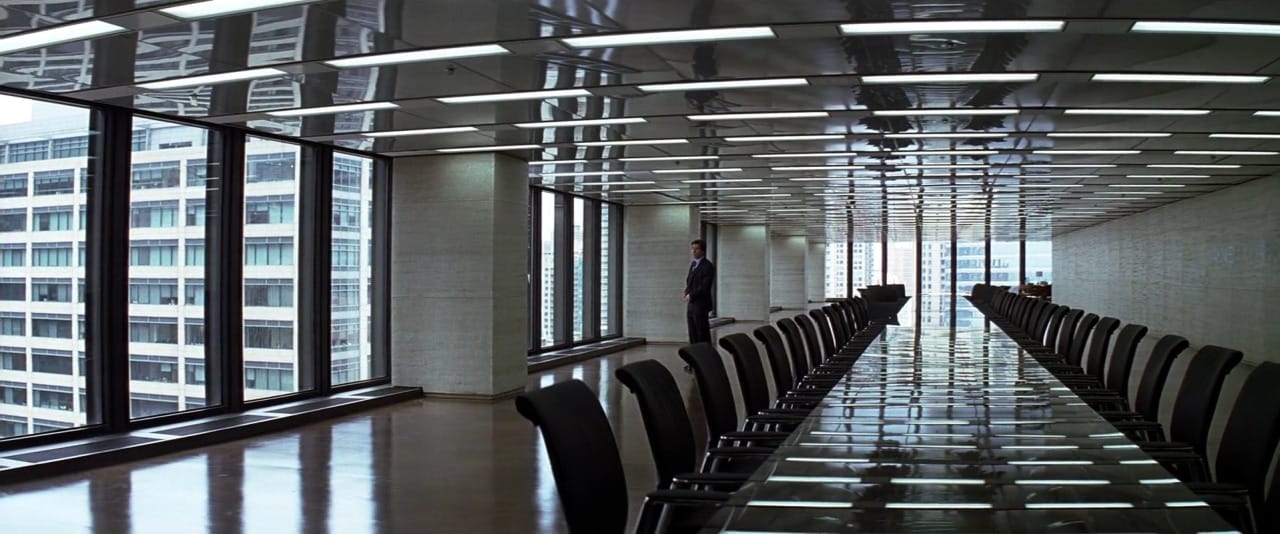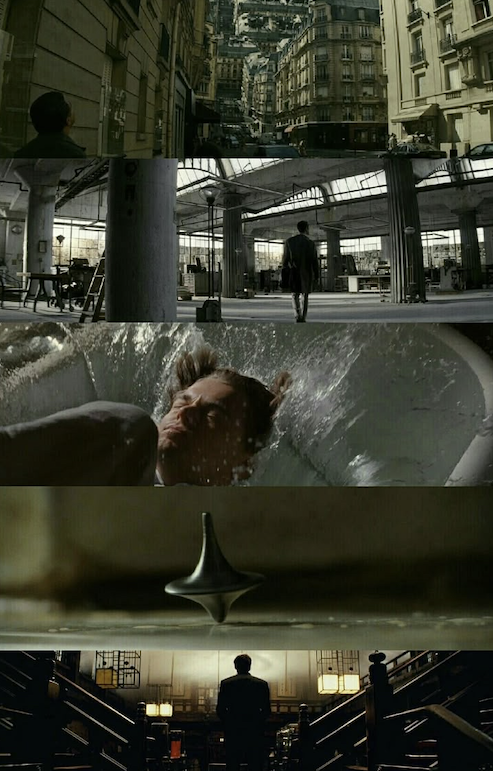After failing high school - disillusioned with the meaning of life - David drifted until he was introduced to the Metaphysics of Quality. He now spends his time living the philosophy and hopefully demonstrating to others its greatness!
The Real Enemy of Art Isn’t 'Greed'
How Our Current Metaphysics Enables Social Power To Immorally Decide Art And Culture.


I’ve just watched the above video and whilst I was highly impressed by its research and presentation - I was left wholly disappointed by the end. It's a video essay which is similar to many online complaining about the quality of modern film. Well researched - well presented - but very thin on actual diagnosis.
This video in particular spends much of its 13-minute runtime demonstrating the problem that we don’t have “every-man,” “ugly” actors in today’s films. Apart from briefly settling on an early sub-diagnosis that “people generally look younger now,” it really only spends the final few seconds actually answering why. Which is pretty wild for a video titled 'Why aren't actors ugly anymore?' but yeah surprisingly not uncommon.
The answer the video does finally settle on - 'greed' - massively undersells the root cause of the problem too. Greed isn’t the root cause; it’s the expression of a key value that sits on the immoral side of a deeper conflict. That conflict is not necessarily between different values held by different groups of folks, but between shared values organized in opposing ways. Indeed, using the lens of the Metaphysics of Quality (MOQ) to look at these conflicting values is far superior than our current metaphysics. It shows clearly how one group of values which serve social power and others that serve intellectual and Dynamic Morality - are both in conflict and it clearly shows which group of values we ought to follow.
Because what’s at stake here is not whether we value meaning, creativity, and connection - we all do - but whether those values are allowed to guide culture, or are subordinated to other values that immorally concentrate social power and exclusively serve it. This is a conflict that is the most significant moral struggle of our time - the conflict over Intellectual Morality.
So the answer to the question “why are there no ugly actors?” is found with far greater clarity by looking at the politics and the monopoly dynamics with our better - morality focused lens - and find conclusions that go beyond simply greed and politics and into deeper issues of evolutionary morality.
In the previous post I outlined ways in which American culture has been immorally divided through politics with the aid of an amoral metaphysics in service of social level power. I have also outlined previously how an aesthetic and general atmosphere of amoral coldness is actively supported by our current metaphysics and how this undermines the importance of warmth, emotion and values generally within films themselves.
In this piece I’d like to combine these two themes and show how concentrated social level power - at the violation of Intellectual and Dynamic Morality - reveals itself in culture and the arts of both film and music.
Because it's far too easy for film studio executives to exclaim that what “the people” want is blockbuster franchises, Netflix slop, or sequels to previously successful films. This claim shrouds not just deliberate decisions made by those executives in the name of the power of their corporations - but also hides the market realities which granted these executives that power in the first place. Contrary even to cultural critics common claims - the popularity of these films is not the active choice of “the people”.
“The people” didn’t choose the lack of a competitive market and the hollowing out of mid-market films and the risk taking that went with it. Indeed "the people" aren’t expressing preferences in a free market; they’re reacting to saturation, hype, and a lack of alternatives. The current situation - and especially the types of films that are being made - are a function of the consolidating of social-level power in the hands of the few. The few who have been empowered to dictate to the masses what's acceptable to show them on screen.
In other words the lowering quality of modern films has occurred primarily as a result of an amoral metaphysics and its exploitation by social level power.
Because in case anyone has looked at the film industry over the last half century - consolidation and monopoly - as with the American economy as a whole - has been the norm.
With that consolidated power studios are incentivised to go for the big smash hit - and to sharply focus on its success to justify their increasingly large stock market valuations. That focus on success at all costs has increasingly eliminated anything within a film that could be deemed a risk. Blockbusters, franchises, IP recycling, and spectacle are all risk-management strategies.
Complex plots, darker or unusual lighting, unusual shot composition, gritty and realistic looking makeup and costumes, realistic looking sets, an unknown star, and as the above video shows - even the ‘ugliness’ of the actors themselves is all too often spreadsheeted away from modern films.
When these films succeed, the logic reinforces itself. The more synthetic the output becomes, the more justification there is to continue in that direction. The result is culture increasingly indistinguishable from advertising - art aimed at the lowest common denominator, not because people demand it, but because it serves the expansion and preservation of social power.
Those who lose out are not just audiences, but the values represented by Intellectual and Dynamic Morality. When marketing budgets dwarf artistic budgets, creating high quality art becomes optional. When slop succeeds, social power is further legitimised. The race to the bottom accelerates.
Technology has only intensified this. Streaming platforms encourage isolated, distracted viewing, shorten theatrical windows, and optimise films for small screens and divided attention. Scenes are repeated, pacing is flattened, lighting is washed out, and action is front-loaded. These choices are framed as serving audiences, but overwhelmingly they serve platform incentives.
Streaming platforms may claim these changes are what audiences want, but this avoids the harder question of audiences’ longer-term values. And with AI just over the horizon - these issues will only become even more pertinent. Are people demanding this race to the bottom, or are platforms satisfying short-term social-power incentives while neglecting the cultural consequences of shaping our shared stories this way?
As I've touched on previously, our amoral metaphysics and its enabling of social level power goes beyond aesthetics and story structure and into the values of the story's themselves.
With an amoral metaphysics, social power has empowered itself to cast aside the cultural and moral importance of the stories it creates. Something which for the great majority of our shared past has been their understood function.
Since the beginning of human culture, stories have never been “just entertainment.” They’ve been one of the primary ways societies made sense of value.
Through stories, cultures didn’t just reflect what they believed - they tested it. They compressed lived experience into memorable form so ideas about loyalty, courage, justice, betrayal, suffering, and humility could survive beyond any one generation. Long before abstract moral theory or formal law, stories showed people what mattered by placing values into real lives and real consequences. They trained moral compasses without needing constant enforcement, giving communities shared reference points for how to act, what to value, and what to resist.
To dismiss stories as “content” or even "just entertainment" would once have been incoherent to humans in the past, because they were precisely how the moral lessons of human experience were comprehensible.
Yet aided by an amoral metaphysics this understanding of the cultural significance of stories has been increasingly undermined - to the point where judging by most blockbuster films and much of the streaming slop of today - it's almost foreign. Social power has viewed stories not just as merely amoral 'content' to capitalise - but also for their moral component to be mostly avoided, ignored, or shrouded behind the shine of spectacle.
That's not to say there isn’t a place for films which seek to entertain. But even the idea that entertainment and morality need be opposed in the first place is antithetical to a true understanding of human experience.
You can see this shift clearly when you compare the kinds of films that dominate today to mainstream cinema from the three decades between the 80s and 00s. The key difference is older popular films treated moral change as transformative - something that had to occur for a story to resolve - whereas many contemporary films treat morality as texture - something to be displayed without ever being allowed to necessarily determine outcomes.
Older popular films were rarely embarrassed about stating a moral lesson, even when they were broad commercial hits. Jaws was about acceptance versus denial. E.T. centered empathy and the protection of the vulnerable. Even unapologetically commercial action films like Die Hard or Independence Day were comfortable making clear moral claims by the end. Die Hard ultimately affirms humility and solidarity over lone-wolf bravado, while Independence Day insists on collective action and sacrifice for a greater good.
Arnold Schwarzenegger’s True Lies is entirely driven by transformation too - with both the title character and his wife becoming more fully realized versions of themselves by the films end. Terminator 2 similarly structures its entire plot around transformation rather than endurance: the Terminator evolves from programmed killer to ethical guardian, Sarah Connor moves from traumatized reactionary to deliberate moral actor, and John Connor grows into leadership. The action exists primarily to test and confirm moral change rather than merely to prolong survival.
The original Star Wars trilogy was equally explicit about moral growth: learning through failure, the dangers of unchecked power, the necessity of restraint, and the possibility of redemption. Luke becomes worthy not because he is innately pure, but because he learns humility, patience, and self-control - the way of 'the force' taught by experienced elders. Power without discipline is the villain. Moral clarity is not easy, but it is decisive.
Later iterations largely abandon this kind of protagonist moral development in favor of hollow labeling, painting protagonists as unquestionably, naturally good, un-tethered from meaningful failure or growth. Instead growth is replaced by moral assertion. Even Luke’s moral growth from the first trilogy was undermined and transformed into nihilistic despair.
This shift matches that of many other modern streaming action films like Red Notice, The Gray Man, or Extraction which adopt the surface language of moral seriousness - corruption, exploitation, institutional rot - while ensuring nothing actually rides on it. Character growth, if it occurs at all, is a result of the action in the film, not the driver of it. Consequences are aestheticized, flattened, or erased.
This also lines up with many other contemporary prestige, streaming, or blockbuster films too. Films like Once Upon a Time in Hollywood or Bohemian Rhapsody present style, performance, and vengeful payoff as unquestioned goods, while deeper moral questions - power, exploitation, humility, justice - are quietly backgrounded. Others, such as The Wolf of Wall Street, American Hustle, or War Dogs, gesture toward critique but refuse moral resolution, leaving audiences suspended in ironic distance rather than judgment. Wrongdoing is displayed vividly and seductively, but never meaningfully confronted.
As I’ve mentioned previously, Don’t Look Up is emblematic here as a political film: it partially identifies elite failure, but collapses into nihilism rather than moral clarity, mistaking exhaustion and despair for critique. Awareness substitutes for judgment. The film knows something is wrong, but refuses to boldly point at the fabricated and unproductive division that created that exhaustion - or what should follow.
Irony itself has become another way to hide any clear message. Films like Deadpool or many others from the post-Endgame MCU preempt seriousness through constant meta-humor, ensuring that no moral position is ever held long enough to risk embarrassment. Violence, power, and sacrifice are endlessly referenced, endlessly undercut, and ultimately rendered weightless.
What emerges is cinema that avoids moral lessons not out of sophistication, but utility. Not just because avoiding clear judgements enable endless film continuation - but because clear judgement risks offending or even risks putting social power in a moral box.
To make clear moral judgement would be to go against the mood of the times which is moving increasingly in an amoral direction. To make moral judgement risks alienating not just local American audiences, but the elites who fund the films, or the global elites who have different views on human rights. To make moral judgement risks folks realising that one of the biggest problems of morality of today isn't necessarily the values of each other - but of social power which prevents change for the better. Far safer to hide behind a metaphysics which encourages 'serious' amoral neutrality before anything else...
Modern films aren’t just written differently - they’re often watched differently too. As social power consolidates and an amoral metaphysics becomes dominant, detachment becomes the default posture for both creators and audiences alike. Films are built to be observed, not morally entered; irony replaces conviction; and taking a story’s values seriously is treated as either naive or 'cringe'. After all - any disappointment can be passed off as temporary whilst simply waiting for the sequel to make any moral arc amends.
Indeed, as the above video demonstrates, the types of populist 'everyman' films that would usually increase the cultural connection of common folks to each other and remind them of their shared values are undermined. Social power demands amoral perfection and any ordinary looking folks or stories about ordinary lives are often conveniently deemed 'too ugly' or 'too boring' to ever make it on screen.
Even film criticism, in its effort to be taken seriously as an academic pursuit, often shies away from the moral content of films altogether. Instead, it focuses on everything around a film - cinematography, writing, directing, acting, score, structure, technique - while rarely asking whether the values a film promotes are good or bad, whether its protagonists actions are worth admiring, or whether the story leaves the culture better or worse off.
When those questions are raised, they’re often dismissed as “subjective”, as if moral evaluation itself were un-serious or illegitimate. That dismissal conveniently ends the discussion before it really begins.
While their reluctance has begun to shift with some modern YouTube criticism - which is more willing to openly grapple with values, meaning, and moral consequence - the deeper aversion remains. Moral judgment is still widely treated as something to be avoided, rather than as the central reason a story matters at all.
Given our amoral metaphysics, this reluctance to discuss morality and values is understandable. But it is not inevitable. With the Metaphysics of Quality, we are fully equipped to have productive discussions about values and morality - discussions grounded not in mere subjectivity, but in a logical, moral, and evolutionary understanding.
Indeed, as the video above inadvertently demonstrates, film reviewers and cultural critics are often resistant to discussing politics or economic arrangements. Sometimes this is out of fear of alienating one half of their audience. Other times, it's simply a lack of sanguine awareness of how much control we have over them and how deeply these arrangements are shaping our culture, values, and the stories we tell ourselves.
In either case, the underlying condition is the same: an amoral metaphysics that treats economic and political structures as neutral, inevitable, or beyond moral evaluation. Social power takes advantage of this metaphysical blind spot to quietly displace moral judgment and put itself in charge. Over time, it has shaped our political divides, narrowed how issues are discussed, and kept people locked into opposing camps while deeper conversations about shared values are avoided altogether.
This works by shrouding clear moral decisions behind the language of market logic, cultural inevitability, or neutrality - presenting outcomes as “just how things are” rather than as choices that privilege some values over others. Acceptance of this framing is then subtly enforced: question it too directly and you risk being pushed into an ideological label, where moral reasoning gives way to loyalty, and questioning the chosen frame becomes the real sin.
It's been well documented that with the rise of monopoly and economic consolidation are the conditions rife for increased amalgamation of social level power into authoritarianism and fascism.
And today - we can see that this is true not just in the political and economic sphere but in the sphere of art as well. Where art neglects its vital role of encouraging high quality values and behavior in the culture at large. Where art also neglects its political and cultural moment. Where art neglects these things - its critical role in serving Intellectual and Dynamic Morality is wholly undermined paving the way for social power to devastatingly expand.
This trend of social power consolidation is true not just in film either but in the music industry too. Where there were previously dozens of major and mid-tier labels throughout the last five or so decades these have been reduced to just 'The Big Three'.
With that cultural consolidation of social level power and the disappearance of mid tier labels- artists have far less power in negotiating deals and bargaining. While digital distribution has lowered entry barriers - power in owning rights and monetizing them at scale has become even further concentrated.
Indeed, labels are now in publishing, merchandising, touring, branding and promotion. This is immense power that makes it essentially impossible for independent artists to compete.
Also streaming didn't weaken label power - they still own all the music. So their relationship with streaming platforms is more symbiotic than it is imbalanced.
But the streaming platforms aren't without social power of their own. They wholly control the visibility of artists on their platforms - especially through the algorithms of music they recommend. This is essentially a near-monopolistic control over what the culture can find valuable in music.
As with the film industry - all this consolidation essentially transforms the music industry into artist risk aversion and the following of fixed 'winning formulas' rather than genuine talent. Existing and established artists are given the majority of opportunity whilst for upcoming artists there's many barriers to greater success.
Artists now are even expected to have minimal artistic growth throughout their careers and have a clear image and direction outlined before being offered opportunities. As a result fewer distinct voices emerge over time. Labels select for artists who are legible as brands: have clear aesthetics, personas and easy to understand narratives.
Risk - then - is often pushed onto the artists financing themselves. As a result it's increasingly the case that only the already-wealthy are given the lions share of opportunity.
Songs too - are now often tailored to algorithms. These algos are controlled entirely by the socially powerful platforms and result in art which is in service of that power rather than what artists or even audiences necessarily prefer.
Songs become shorter as well - with hooks within seconds, and are also often mood coded for playlists. Risky structures, long builds, or stylistic genre-benders are 'too risky' and so filtered out before even being released. Genres that don’t scale globally or fit platform categories lose institutional support.
All of this immorally puts social power above the artistic pursuit of creation in response to Dynamic Quality. It also immorally puts social power above the control of culture rather than Dynamic or Intellectual values.
As with our film example - this change didn't come about because it's best that there is so much social level power involved in the creation of art in the music industry. "The people" didn't demand this. This is the result of social level power seeking to increase that power, reduce risk and succeed with minimal effort.
To be clear - this instinct of following cultural success is understandable. But when social power undermines or opposes Dynamic and Intellectual Morality, it becomes immoral. Markets should therefore be shaped so that incentives and regulations reinforce and uphold these higher moral codes.
However as it is now - just as with elite framings of ('right-wing' authoritarian) populism as the choice of the people - so the choice of the algorithms are framed as purely the choice of the people. Social power conveniently neglects the value of a higher level and instead hides behind the false veneer of an amoral and democratic choice - alluding to Dynamic Morality - when it is anything but.
These trends aren’t just true in film and music - though, due to their outsized economic impact, social power has come to disproportionately leech much of that influence for itself. But these trends are also true to varying degrees across all art. Literature, visual arts, and even digital media for example - all suffer from similar issues.
What should be clear by now is that film and music are not shaped by individual artistic intent alone. They are deeply shaped by economic and political conditions. At a deeper level still, they increasingly reflect an amoral metaphysics - one that privileges the expansion and preservation of social power over doing what's right.
That metaphysical frame doesn’t just undermine artists creating the best art they possibly can. But it also corrodes our ability to talk about art and culture at all. Just as social power uses an amoral metaphysics to push art toward amorality, it also pushes cultural discussion away from meaningful political, economic, and artistic critique. Moral questions are flattened to relativism, displaced and pushed aside, or dismissed entirely before they can be seriously examined.
So modern films and music aren’t worse because audiences changed or artists lost talent. They aren’t worse simply because of “greed,” and they aren’t worse only because of economic or political arrangements. They’re worse because concentrated social power has used an amoral metaphysics to shape culture in its own image - allowing it to control cultural outcomes in ways that systematically undermine Intellectual and Dynamic Morality.
And this is where the Metaphysics of Quality first comes to the fore. At a minimum, the MOQ clearly supports the artists who are on the correct side of this conflict. It promotes a deeper appreciation of the values that drive their work, and the reduction of monopoly and the social power it represents in the industry. But the MOQ also provides artists and common folks alike with a moral lens and language that allow them to orient themselves within cultural evolutionary conflicts. It helps everyone to clearly see which values are being served, and which are being suppressed.
Applied directly to film and art criticism, the MOQ gives reviewers and audiences a way to evaluate a work’s moral story without continual justification. Viewers can ask whether a film actually supports the values it gestures toward. They can consider whether its characters’ actions are worth admiring or instead serve as meaningful moral warnings. They can also ask whether there is genuine moral growth and whether the consequences make sense. Perhaps most importantly, they can ask whether the story leaves the culture better or worse off for having experienced it.
In doing so, moral evaluation can no longer be dismissed as “just subjective” and instead can be recognised as an assessment of real qualities present in the work itself.
The usefulness of the MOQ doesn't stop with audiences or critics either. It also applies to those closer to the levers of power. Media organisations can use it to scrutinise political and economic consolidation rather than normalise it. Academics writing from amoral frameworks can check whether those frameworks quietly justify the expansion of social power at the expense of common folks and higher morality. Politicians passing laws can use it to assess whether they are serving Intellectual and Dynamic Morality rather than merely reinforcing existing power structures. Even corporate leaders and the workers within those institutions can use the MOQ to test whether their decisions align with evolutionary morality or merely advance social-level dominance.
I’m not naïve to think these changes will arrive any time soon. Of course the folks who are closest to power are going to be the least likely to see the utility of this lens. The pragmatism of following power is very strong, and standing apart from it all too often comes with real personal cost. Especially in the modern political environment. But what the MOQ does do is provide folks within each of these areas the uniquely intellectual grounding to follow good conscience and to intellectually and logically support the right thing.
And this is where the MOQ’s second major strength becomes clear. Because by their very nature of being far from the halls of influence - common folks have a vitally important democratic role in ensuring Intellectual and Dynamic Morality are served. And at every point where social power expands, it empowers folks to identify the immorality involved without collapsing into any of our modern day pitfalls of cynicism, relativism, self-righteous sanctimony, tribal loyalty or even the ultimately empty accusation of “greed".
When outcomes are framed as “inevitable,” “what audiences want,” or “just how the market works,” the MOQ instead gives people the tools to expose the social power shaping those decisions and to strip away the false neutrality that conceals it. Crucially, it uniquely does this using intellectual logic - the language of elites themselves. With a clear understanding of the MOQ - moral criticism can't just be dismissed as emotional or naïve - but as a valid understanding of how things work and also as a clear guide on the way forward.
The Metaphysics of Quality lens takes us much further than simply identifying immorality when it appears then. Its capacity for compassion, clarity, confidence and direction - is vitally important too. It gives folks a way to point at immorality in productive ways that are more likely to bring about change. It also helps to ensure folks can act with far greater confidence that higher values are guiding what we create, what we celebrate, and what we become. And that's better for all!

Power Thrives on Rigid Labels. Democracy Thrives on Values.
How an amoral metaphysics enables social power to influence shared cultural dialogue in an untold number of ways. Thankfully there's a solution.

One of the central failures of Bernie Sanders and much of the modern American left is a persistent failure to clearly distinguish socialism from democratic socialism, and more broadly, a failure to appreciate what kind of power each actually entails. When asked about the socialist label, Bernie has been all too proud to speak of how great that term is while seeking economic justice and that Americans were wrong to think otherwise.
Following much of Bernie’s lead the “socialist” label is often worn casually, even proudly, among American leftists since Bernie's rise. What goes largely unexamined though - is what that label quietly smuggles in: not care, not fairness, but an acceptance of social-level power concentrating under the cover of higher intellectual or moral authority. Cries that capitalism’s immorality can only be solved through socialism or communism are common, but they miss the deeper problem entirely.
The issue isn’t capitalism as such - it’s what values control culture, and who and what gets to enforce them.
Under socialism or communism, elites don’t disappear; they simply rule in a different way. Power concentrates in the hands of those who claim superior knowledge, superior theory, or superior moral insight. Control is exercised not openly as social power, but indirectly through intellectual authority - through “reason”, “expertise”, and claims of technocratic inevitability. Exploitation doesn’t vanish; it’s concealed and justified as rational, unavoidable, or morally required in the name of the greater good.
Democratic socialism, by contrast, at least aims to keep power with the people rather than surrendering it to a self-authorising intellectual class. An informed public, representing intellectual and Dynamic morality, can curtail social-level power rather than merely replacing one elite with another.
Of course, democratic socialism is not without risks. Corruption of elected officials, institutional inertia, and complacency are all real dangers.
Capitalism, meanwhile, plays a more nuanced role than it’s usually given credit for by these socialist types. Its financial incentives often provide genuine responsiveness to Dynamic Quality - to change, innovation, and adaptation - in ways centrally organised systems frequently struggle to match. That responsiveness matters, and when it works well it can surface new value quickly.
But capitalism also carries a serious moral flaw of its own. It has a tendency to quietly smuggle social-level power in under the banner of Dynamic success. Wealth accumulation, market dominance, and scale are too easily mistaken for proof of superior value, when in reality they often reflect the consolidation of power rather than the emergence of better ideas or practices. Left unchecked, capitalism doesn’t just respond to Dynamic Quality - it converts social power into permanence, allowing those who win early or win big to shape the rules in their favour. Capitalism alone, then, is no more virtuous than socialism alone. Both become immoral when they’re absolutised.
Calls for pure capitalism or pure socialism are therefore deeply flawed, not because each lacks moral intention, but because both allow social-level power to masquerade as something higher. Socialism tends to justify power through claims of intellectual or moral certainty. Capitalism tends to justify it through claims of market success and efficiency. In both cases, social-level power sneaks in beneath a higher moral code and then shields itself from challenge.
A functioning democracy is different. It is not a moral system run by the socially powerful. Its value lies in its ability to respond to Dynamic Morality. Democracy matters not only because it allows a minority to become a majority, but also because its function is to prevent a socially powerful minority from imposing its will on the majority. When functioning correctly, it keeps social-level power unstable, accountable, and open to correction.
From an MOQ perspective, democracy’s moral strength is precisely this openness. It does not freeze value at the social or intellectual level. Instead, it creates the conditions under which better ideas, better arrangements, and better values can emerge over time. When democracy fails, it is usually because this Dynamic function has been undermined, not because democracy itself was the problem.
This is also why the endless framing of politics as a simple battle between “left” and “right” has become so unproductive. These labels increasingly obscure more than they reveal. They collapse complex moral questions into tribal identities and encourage people to defend camps rather than examine values. Democracy is not about choosing between rigid ideological extremes - socialist, capitalist, fascist, or otherwise - but about maintaining a culture capable of evaluating and revising its values over time.
When politics is reduced to label warfare, attention shifts away from whether ideas improve lives and toward whether they signal loyalty to a side. This replaces Dynamic intellectual moral inquiry with static ideological allegiance. The result is not democratic vitality but cultural stagnation, where extremes feed off one another and genuine moral progress is crowded out by symbolic conflict.
This left–right framing is also highly useful to social-level power. By organising politics around opposing identities rather than shared values, power becomes harder to see and easier to excuse. Decisions that shape culture and material life can be blamed on “the other side” instead of traced back to concentrated influence operating above those divisions. This redirects conflict horizontally between groups, preventing it from turning vertically toward the social power that actually shapes culture and undermines democracy’s intellectual and Dynamic function.
Take deindustrialisation and deregulation, for example. These policies, most responsible for hollowing out the American middle class, were not the product of a single party or a sudden moral failing among voters. They were the result of decades of elite-driven neoliberal policy embraced across the political spectrum and justified through an amoral metaphysics that presented this economic framework as objective, inevitable, and beyond democratic challenge. Communities were dismantled, jobs shipped overseas, and social bonds eroded in the name of efficiency and growth as defined by those already in positions of power.
Parties on both sides whilst all this was happening were disagreeing for sure. But not coincidentally only one set of values found its expression - that of the socially powerful.
This is precisely what the Metaphysics of Quality makes visible: morality is not found in rigid idealistic systems, but in how well cultures remain open to Quality and un-corrupted by the socially powerful over time.
The real failure of the American left generally, then, has been its growing comfort with elitist attitudes and its failure to clearly distance itself from them in the public consciousness. This failure has led to the increasingly accurate equation of “leftist” with “elitist” in the minds of many working-class voters. It wasn’t simply that the working class “turned right”; it was that they were abandoned, dismissed, or spoken down to by people who claimed moral authority while neglecting material and social realities.
This attack on “elitist leftists” by the American right still hasn’t ended. And it continues to land because the underlying attitudes that provoked it - moral policing, condescension, and a refusal to listen - have not meaningfully changed.
This persistence is due to a continued blind spot across much of the American left itself: a failure to recognise how social-level power continues to shape not only the culture at large, but their own understanding of it. Through the lens of the Metaphysics of Quality, this is a familiar mistake - confusing social status and intellectual confidence with intellectual morality, and mistaking certainty for clarity.
Rather than listening to or materially helping people who had been economically and culturally hollowed out, the left has increasingly defaulted to scolding. A set of ‘woke’ attitudes emerged that functioned less as expressions of care and more as mechanisms of social control. Language, posture, and symbolic purity became the focus, while material conditions were sidelined.
Scolding is the primary way power relates to the people. This is not how healthy cultures are built. It is how elites manage populations they do not want to understand or meaningfully engage with.
To top it all off - technology hasn’t helped either. Rather than just opening culture up to better ideas, it has overwhelmingly rewarded outrage, straw-man over-simplification, and tribal loyalty. Modern American political influencers on both sides feed off rapid news cycles and algorithmic incentives that encourage blind allegiance to one social-level side. This technology-driven dialogue replaces open intellectual inquiry with social-level allegiance. Disagreement is treated as betrayal rather than an opportunity for improvement.
The result of all this is a culture increasingly convinced that it is deeply and irreparably divided. But this framing is profoundly misleading. What appears as division is more accurately a population that has been fragmented by narratives shaped by social-level power. Narratives that benefit from distrust, resentment, and perpetual conflict.
The rise of the authoritarian modern right did not emerge from nowhere then, nor was it simply the product of ignorance or manipulation. It arose from the material and cultural vacuum left behind when bi-partisan policies stripped people of stability, dignity, and meaningful work. And politicians did so while keeping folks divided and that these economic circumstances were merely the neutral operation of the economy and not something in their control or up for discussion.
When the damage became impossible to ignore, the response from the socially powerful on both sides was not listening or reform, but further moral chastisement. Blaming the poor for their own failures. Structural harm was reframed as personal or cultural failure, allowing elites to avoid responsibility for the conditions they had helped create.
From an MOQ perspective, this is exactly what happens when social-level power hides behind an amoral intellectual framework. The degradation of culture toward reactionary social quality is rebranded as inevitable, and the resulting anger is pathologised rather than understood.
What followed was not a mysterious turn toward reaction, but a predictable response to a culture quietly hollowed out in the name of social-level power, all in plain sight.
The popularity of One Battle After Another among American left audiences is a telling example of this intellectually blind attitude of elites. It's structured around opposition rather than discovery. Its narrative defines characters and meaning through fixed camps, where the enemy is already known and resistance is the only remaining task. Because the story depends on maintaining this clarity, it never turns its attention to the deeper forces that produced the conflict in the first place. Power remains offstage, while identity and opposition take centre stage.
This makes the film counterproductive to what it most needs to do. At the moment the culture requires a renewed focus on shared values and the structures shaping division, the film reinforces a left-versus-right framing that stabilises social-level identities instead of opening space for intellectual or Dynamic inquiry. Division is not a result of the story. It is a requirement of its narrative logic.
Don’t Look Up - the other popular political film from recent times - for all its strengths, suffers from a different but related limitation. It builds its narrative around the gap between those who know the truth and a public that refuses to act. The tension of the story comes from apathy, distraction, and denial in the face of overwhelming evidence. Catastrophe is framed as the result of cultural un-seriousness rather than structural design.
What the narrative largely leaves unexplored is how that apathy was produced. Media, incentives, and elite interests appear as absurdities rather than as forms of social-level power shaping behaviour at scale. The story stops at intellectual failure without tracing the suppression of intellectual and Dynamic Quality that made such failure predictable. The result is a satire that directs frustration toward the public, rather than toward the forces that benefit from confusion and inaction.
Because despite everything, people still do share remarkably similar underlying values: meaningful work, security, distrust of elites, and a genuine voice in shaping their future. What is fractured: is not the culture itself, but the language and metaphysics people are given to understand it.
Until that manipulation by the socially powerful is named explicitly, carefully, and without contempt, the same mistakes will continue to be made and the unproductive divisions will persist. Reminding folks of the social powers control doesn't solve the problem by itself. But what it does do is restore the culture’s ability to redirect conflict away from symbolic enemies and back toward the values and concentrations of power that can actually be corrected and change things for the better.
And this right here is one of the many strengths of the Metaphysics of Quality. It provides common folks a language and framework that is both logical and morally sound. It keeps evolutionary conflicts of morality at the front of mind whilst they evaluate elite suggestions. And the key here is that with this better metaphysics they can uniquely do so in the intellectual language of the elites. Thus uniquely enabling common folks to perform their vital role in ensuring both Dynamic and intellectual morality are served. And that’s a very powerful thing indeed!

WAR - The Final Stage of Social Level Power Control

I first came across Dennis Kucinich when he ran for president in 2004. He stood out as someone whose policy ideas I mostly agreed with - especially his unique proposal for a Department of Peace. It was a proposed cabinet-level office devoted to projecting some of America’s best values into the world: democracy, justice, human rights and peace.
The vision of a department promoting peace was simple but profound: a world where countries appreciated their uniqueness and worked to resolve disagreements democratically and peacefully.
The idea wasn’t unique to Kucinich; it went all the way back to Benjamin Rush, one of the Founders, who dreamed of a Peace Office to balance the War Office. But Kucinich made this old idea feel alive again. One that wasn't merely tied to religion as Rush had done.
Recently too, Kucinich received some recognition for that advocacy; The Washington Post credited him as a kind of Bernie Sanders before Bernie was on the national stage. Knowing about this proposal - albeit long distance aspirational - gave me hope that America could still be guided by important intellectual values that promote Human Rights.
But now President Trump along with Secretary of Defence Pete Hegseth has almost completely undercut any progress Kucinich made in this more peaceful direction. America hasn't just stalled or slipped backward in theory - she's gone sharply in the opposite immoral direction.
Hegseth - with Trumps direction - has sought to symbolically rename the Department of Defence back to the Department of War. At first glance, it may seem like a small and symbolic change in rhetoric. But rhetoric from an administration with real power is never merely symbolic. It carries weight. It shapes how America or the administration acts, and how the world understands those actions.
This is an embarassment!
— Ed Krassenstein (@EdKrassen) September 5, 2025
Defense Secretary Pete Hegseth just announced we are renaming the DOD to "The War Department", saying:
“The War Department is going to fight to win, not not to lose. We’re going to go on offense not just on defense. Maximum lethality. Not tepid… pic.twitter.com/QLBwwwzyXS
Because why do people want to attack America? Hegseth and Trump probably think the answer is simple: “They’re evil”.
But evil doesn’t just appear out of nowhere. Something produces it. And if something produces it, maybe it can be stopped - not only with weapons, but also with prevention rooted in thought, morality, and understanding. In times the threat is real, there are also far more humane ways to respond - by capturing and providing people their habeas corpus rights rather than extra-judicially taking their lives. Under the law even, lethality is only ever an absolute last resort.
All this concern with legality or defending America, though, is now out the window. In its place, a new moral framework is taking shape - one where intellectual morality no longer guides social values. Instead, raw social-level power becomes the standard. This shift doesn’t just abandon defence - it replaces it with a philosophy that prizes dominance over principle.
This renaming of “Defence” to “War” celebrates this grotesque direction. It signals that the Trump administration appears to no longer want to protect through principle or restraint, but to project force with little regard for law, human rights, or deeper moral reasoning.
This is more than a change in rhetoric then - it’s a philosophical shift. It shows America stepping deeper into an unthinking embrace of social-level control. And the more that control spreads, the more intellectual morality withers. As intellectual morality withers - the social level gains further dominance seeking more power through unthinking force. The greed of social level power knows no bounds.
A war state is the final stage of this social level driven transformation - seeking power and dominance no matter the immoral cost - and America is increasingly becoming just that. Intellectual Morality be damned.
On days like today, it’s hard to be hopeful for the moral trajectory of the world. I worry deeply about what the next few years of this administration will bring. But I still hope that America’s laws and judicial system - designed to protect intellectual morality - will withstand the continual attacks from a President very clearly driven by a very different set of lower values.
If only folks knew of a better metaphysics - a better way - maybe then things could or would be different. With a strong and intellectually grounded moral compass, America could look not to a Department of War, but to a Department of Peace - much like Kucinich proposed years ago - and celebrate a very different set of higher morals.
While we watch aghast - it is the profound potential of this moral philosophy that provides hope.
Superman - The Populist Hero We Needed
Apologies to readers :: This post has been updated both in terms of Superman history and a far more accurate understanding of the film Man of Steel. The update was inspired by an excellent video essay of Zach Snyder's entire filmography(including good things about his work which I agree with) by Patrick Willems which made clear the mythological aspects of the film that I'd neglected.
Superman was the first ever comic book superhero. Looking to communicate moral concerns beyond religion, the comic combined ancient myths and modern moral issues. Ever since then superhero comics - and their cartoon and live action adaptations - have provided readers and viewers moral guides for navigating the world; something mostly neglected by our current amoral metaphysics.

The comic was created towards the end of the Great Depression and with the tides of Fascism and Communism in the air. Superman was created as a democratic symbol of hope, anti-elitism, and a champion of the oppressed. He defended the poor from greedy landlords, workers from abusive employers, victims of domestic violence from the violent, and the wrongfully accused from their accusers. And he didn’t stop with cases where there were always clear victims; he also tackled systemic injustice by going after corrupt politicians and war profiteers.
The protagonist wasn’t just Superman either, he was Clark Kent, a newspaper reporter who, in true populist style, wholly appreciated the importance of intellectual values. Finding the truth and acting on it in the name of his version of justice and fairness - these were the values of Superman.
In a world full of corruption and desperation, Superman gave hope to the poor who had been on the bad end of the s%$t stick for too long. They could look to him as an example of someone demonstrating how to live in the less-than-fair world around them. They might not be able to do all that he could, breaking laws to get his way, but Superman's brand of justice and protecting the weak were values worth living. This Golden Age Superman - rebellious, morally driven, and politically charged - quickly became a pop culture icon.
Then, after American success in World War 2 and the beginning of the Cold War - a new Silver Age Superman morphed into something different. He became the flying, super-intelligent, super-powerful Superman we see today. This transformation occurred not as a result of a drop in popularity, as throughout the 40s and 50s he was one of the most popular comic characters, but due to a post-war conservative cultural movement. A movement of change that was driven by the post war Red Scare and the anti-subversion atmosphere that came with it.
Where Superman was previously populist, rebellious and carried out his own version of vigilante justice - he now needed to appear safe, loyal and patriotic. So by order of a newly created Comics Code he was reshaped. Moral ambiguity and law-breaking were out - American values of lawfulness, restraint and a perfect morality where he vowed against killing were in.
This shift in Superman’s moral character wasn’t limited to his behaviour either - it extended to the nature of the threats he faced too. They became far more fantastical rather than represent any kind of systemic injustice. Aliens, robots, and science fiction villains were the new while the problems of elitism and class based injustice were the old and no longer used.
After this second Silver Age version of Superman - the comic has waxed and waned between being the vigilante populist hero he once was and the picture of moral perfection fighting aliens and science fiction villains he was forced into being. Bronze Age Superman from around the 70s to the mid 80s, for example, appeared to be a somewhat harmonious amalgamation of the two where writers re-incorporated some populist elements but kept his style of justice on the side of the Law.
Bringing us back to the version of Superman in popular consciousness today - with Lex Luthor as his arch enemy - Lex no longer fully embodies those same Golden Era populist concerns of systemic injustice. But the populist parallels, even with the single Billionaire Lex, are clear.
So in amongst this conflict between the era's of the different versions of Superman and what he is to represent we've had the backdrop of rising inequality over the last four decades and the increasing elite control that goes with it. Indeed while things aren’t quite as desperate as they were when Golden Age Superman was created, America now has the highest levels of inequality and the elites more power than ever before.
As if matching that inequality, a sense of cynical and overly-intellectual hopelessness has infected modern culture for decades. And who can blame folks? Elites have cynically used our modern ‘amoral’ Subject-Object Metaphysics to hide all sorts of immoral behaviour under the language of objectivity. From immoral wars, to economic exploitation, to the corruption and millions of lives taken in healthcare, to the gutting of news laws and the resulting media manipulation, to the weakening of environmental protections and the delay of further action on climate change - the list just goes on and on.
And right there all along, helping them along the way, has been our current metaphysics, which encourages individualistic, ‘scientific’, subject-object thinking and denies and undermines the existence of morality at every turn. Indeed, science has been so successful - who can question the importance of this amoral objectivity?
Embraced by folks who see the power of science; this amoral yet individualistic intellectual attitude has become an increasingly large part of our shared culture. An attitude which views concerns about right and wrong with great intellectual skepticism at best, or naive and foolhardy at worst.
With this background - this brings us to the 2013 film Man of Steel. Following the lukewarm reception of 2006’s Superman Returns - the first Superman film since the Christopher Reeve era - the creators of Man of Steel saw an opportunity for change. Screenwriters David Goyer and Christopher Nolan aimed to ground Superman in realism, while Goyer and director Zack Snyder specifically hoped to emphasise moral ambiguity. Snyder further contributed to this grounded vision with his gritty yet stylised cinematography, marked by bold, powerful imagery.

To achieve this look Snyder used an aforementioned "Heightened Realism" film technique which makes every shot appear dull, overexposed, and cold. If someone were looking for a cold, calculated, and intellectual style of filming - away from the emotions and warmth that colour brings - then this would likely be it. Indeed, the intellectualism demonstrated in this film isn’t the warm, pragmatic style shown by Superman in the first comics. Instead it’s an intellectualism far more in line with our current individualistic Subject-Object Metaphysics - one which views doing good with great hesitation and skepticism and then requires reasons for doing so.
Throughout his childhood, Clark is told by his father to hide his powers - his full goodness - from the world for fear of the repercussions of folks knowing his power. It is only after witnessing an abundance of suffering, including the death of his own father, that Clark finally breaks free from this parentally imposed limitation and begins to act in line with what is right.
When Superman finally and openly confronts the villains, they are portrayed in a highly thematic and mythic way, reminiscent of the grand, otherworldly antagonists of the Silver Age comics. This Superman ultimately does the right thing - but this version is far from the idealised, unwaveringly noble hero of the Silver Age.
The culmination of the film is a choice Superman must make between the lives of innocent bystanders and his fellow Kryptonian who is threatening those bystanders - General Zod. In the end Superman takes the life of Zod and saves the bystanders but the film highlights that this choice isn't without great suffering. It is this choice that the creators wanted to highlight as a reason for Superman doing the right thing and having his 'no killing' clause.
This version of Superman isn't interested in Golden Era concerns of shining a light on moral injustice and standing up for the right things in populist fashion. Nor is it the Silver Age Superman of moral purity who is always on the right side of justice against science fiction style villains. Instead this version of Superman is morally unsure of himself and is overburdened by the consequences of the enormous power he holds. Indeed on a metaphysical level this Superman is struggling with goodness and morality so much that he even requires reasons to do it.
But Creator/director Zach Snyder was never interested in telling those old Silver Age stories and his knowledge of the Golden Era appears mostly lacking - instead by his own admission he was interested in the mythology and depicting larger, deeper mythological conflicts on screen. Particularly the physical consequences of Gods living among men and the awesome power they hold. As Snyder says:
"Yeah, I feel like a lot of people didn't want Superman to grow up. They want him to remain a simpler man from a simpler time. My philosophy is that these characters are cathartic, they're our mythology and they speak to modern problems - when we don't know how to deal with an issue we can superimpose those feelings of impotence on to them and let them solve unsolvable problems."
So in this Snyder version, the attention shifted away from the moral conflicts Superman was resolving, to existential moral uncertainty within Superman himself. While Snyder leans into the virtuous and mythological aspects of Superman, placing the character in a contemporary political and metaphysical framework - this resulted in a very different perhaps unintended message. Instead of affirming the existence of goodness, the film questions it mirroring a growing sense of moral despondency found throughout the world. And it does this all while entirely neglecting the elite concentrations of social level power that cause much of it.
Golden and Bronze Age Superman by contrast, knew what goodness was and is and acted on it in the name of Intellectual and Dynamic Morality as with the populists before them. These versions of Superman, supported by the Metaphysics of Quality, morally highlighted important moral conflicts within modern culture that were unaddressed by existing power structures and neglected by our current metaphysics.
Enter 2025’s Superman film and the reason why I’m writing this. Rather than simply call out a misguided film, I think it’s worthwhile if we also point to one that’s good. If Snyder’s Superman was cold and overly skeptical of doing good, this new James Gunn version is way more in line with Golden Age Superman and open and direct about doing good. Indeed in one scene Superman goes so far as to proudly declare that all he is doing is serving 'Good'. This is a colourful, warm, and pragmatic Superman who doesn’t lament the decisions he makes and is almost too self-assured that he always does the right thing.

But before I go into the detail of that quality, let me get five minor issues with the film out of the way.
Because it would have been better if:
- Lex Luthor had manipulated the people and divided them against each other - distracting them while he carried out his evil plan (more accurately reflecting real life).
- Clark’s real concerns were more about elite manipulation rather than his own identity (although both were rightly included).
- It further highlighted the intelligence of the reporters at the Daily Planet.
- The focus was more 'Golden Age' Superman style on the abuse of the common folk by many different elites (not just Lex) in many different ways.
- The other 'Silver Age' style superheroes were not included - I'm not hopeful for any sequels to highlight the right things from this point forward.
Now the good.
Since Man of Steel we have witnessed the rise of Marvel and superhero films taking over global consciousness. It can be hard to underestimate the impact these films have on our shared culture. So in these times of overt elite injustice, we have been crying out for a film of similar popularity which didn’t just shine a light on some of that injustice but also pointed to a better way.
Where Man of Steel‘s father told Clark to be cautious and skeptical about doing and being good, the 2025’s Jonathan Kent has no such hesitations. The fearful parenting style is gone and something quite different and better has taken its place. As his father says to him:
“Parents aren’t for telling their children who they’re supposed to be. We are here to give y’all tools to help you make fools of yourselves all on your own. Your choices, Clark, your actions… that’s what makes who you are.”
Which is about as strong a statement in favour of pragmatism and goodness, and away from the nihilistic mythology of Man of Steel as you could find.
Indeed, this film is ‘the Superman we needed’. This film:
- Rightly and proudly points out, in our modern often overly ‘individualistic’ culture, that caring is punk rock and people and things are beautiful and worth caring about.
- Quite directly calls out a few major villains in today’s world - something we haven’t seen in a blockbuster of this scale since Chaplin’s brilliant The Great Dictator.
- Provides a positive role model for young men to look up to - something that has been lacking on the screen for a long time. It provides something the rise of the ‘crisis of masculinity’ has been calling out for
- Demonstrates, through an excellent performance of Mr Terrific by Edi Gathegi, how it’s cool to use your intelligence for good - far better than for bad, as Lex does.
- Joins a growing trend of eschewing the Heightened Realism cinematographic style made popular by Christopher Nolan. Colours are finally coming back to blockbuster cinema films.
What I love about the cinematography in SUPERMAN and 28 YEARS LATER is that they both look NEW.
— patrick. (@imPatrickT) July 15, 2025
Maybe some of it feels wrong for a moment, but only because your brain has no reference for it.
Familiar is boring. This is punk as hell. pic.twitter.com/MedNrcIPcq
THIS dude. This is was masculinity is to me. God I hope Superman helps shepherd this kind of manliness into the world.
— Jacob King 🏴 (Comms Open) (@jacobpking) July 16, 2025
"Be strong enough to be gentle." https://t.co/UpIfdRiUPa
It's not often a piece of art that's culture changing is also popular. But that appears to be the case here - and for the better. So with Superman 2025's box office success - I say Rock On. 🤘

The Cage of an Amoral Metaphysics Over Art.
We have gone through a trend, lasting at least the last 20 years in cinema, of something referred to as "Heightened Realism". A preference for shots which look slightly dull, yet somewhat overexposed. The technique is often to take the natural light already existing in a shot and subtly increase it. A dull effect is not what one might expect from increasing light in a scene- yet because only the existing light is being raised, it ends up muting the subtlety of the colors that sit quietly in the frame.
The result is a feeling as though we are right there in the shot with the subject - yet entirely as passive observers. Or perhaps more precisely, we’re overlooking the scene in a cold, scientific, god-like manner. The sterility of the effect, and how it separates the audience from the emotional life of the scene, is perhaps the aspect of it which is most overwhelming.
It’s a cinematographic style that appears dull on the surface. It uses “natural” lighting, a certain graininess, and avoids any sense of creative risk in color grading or light design. It resists stylization in favor of something that pretends to be close to reality but is, in fact, just another aesthetic decision.
Christopher Nolan is perhaps the most famous for this style. And the “scientific observer” quality of his work goes beyond just the visuals. It extends to the sound - audiences have often complained they can’t hear actors speak their lines clearly, just as a distant observer might struggle to pick up speech from far away. The music, too, often follows the same formula: naturalistic, but pushed, exaggerated, heavy.
The key to note perhaps though is that this Heightened Realism is anything but real and is just another style. Beautiful yes, but just another style choice like every other.



To those of us who appreciate a better metaphysics though; the parallels between this kind of thinking and an amoral metaphysics - which denies any sort of human emotion or moral judgement - is obvious. We live in a scientific age, and one creatively trapped by the metaphysics that underpins it. A time where even audiences appear to prefer this kind of aesthetic. A time where science and the apparent necessity of its amoral metaphysics rule the day.
Perhaps this kind of judgement-free thinking is why superhero films have, until recently, dominated the box office. These are stories that allow the breaking of scientific laws - but only by very specific characters. Superheroes are entirely external to us, and even their powers must follow very specific rules for how they break the natural order. They are fanciful, yes - but absolutely everything else around them must remain grounded. Heaven forbid we cast judgement or break free from the self-imposed cage we’ve built.
What’s missed in this way of thinking though - is the simple fact that we exist - and our existence is value. There is nothing but value. Value judgements are just as real, if not more real, than the objects we observe. Even scientific rules begin to fall apart at the subatomic level, but yet we cling to this aesthetic of scientific realism, almost entirely driven by the material success it has brought us.
This cage of scientific-style art is one entirely of our own making. But the good news is—we can break out of it at any time. And we're starting to see the cracks.
Most directly, we can see it in the rise of anime among Gen Z. Anime deliberately shuns realism in favor of something entirely different. But another great example is the underrated yet great and brilliant film Speed Racer.
Dismissed by critics at the time of its release - some even called it “pop fascism” - Speed Racer embraces almost everything that runs counter to the Heightened Realism trend. Except maybe the Heightened part. "Heightened Un-realism" it could almost be called. Indeed Speed Racer is full of heightened color, heightened light, heightened playfulness, heightened emotion and it continually breaks the laws of science to the point where those laws are constantly bent always in service of the story itself. The result is just a great masterpiece of film - one co-incidentally also based on an anime. So now, nearly 20 years later, people are beginning to change their minds on this box office failure. Some are even calling it the most important film of the 21st Century.
But it's not all roses and perhaps this is why I'm writing this post.
Because the latest forthcoming Christopher Nolan film - The Odyssey - might perhaps be the most egregious usage of his Heightened Realism style yet. A film that will bring Nolan’s scientific realism to the Ancient Greeks - a culture that predates our current metaphysics entirely. The juxtaposition between our modern, emotionally detached aesthetic and how things actually were is likely going to be at an all-time high.
Except it won't just be a juxtaposition but a "heightened juxtaposition" if you will..
Nolan, famous for his realistic portrayal of the appearance of a black hole in the film Interstellar, is entirely shunning the experts on what the Ancient Greeks actually looked like or what they wore. Instead he will be pairing his Heightened Realism filmmaking style with entirely fanciful and false portrayals of their armor and dress.
Where modern portrayals often reduce the Ancient Greeks to something stoic, monotone, dominant, and hyper-masculine, they were, in fact, the opposite. They celebrated color and beauty in their clothing. They were emotionally complex, playful, poetic, and deeply involved in democratic dialogue - far from the dominance they are usually associated with today.
A dominance which, perhaps not coincidentally, is plainly visible when animals are observed scientifically. Indeed it is the same value-blind perspective that distorts both our understanding of our uniquely human behavior and the deep and rich fabric of Ancient Greek culture. Our current amoral metaphysics then doesn’t just undermine modern art—it also sustains and enables our misunderstanding of the Ancient Greeks themselves.
Regardless of that exacerbation though; with Nolan's portrayal there is the high likelihood that those who aren't familiar with the Ancient Greeks will be even further led to misunderstand them. The important difference between modern portrayals and how they actually were will be further undermined. While Nolan brings his 'realistic style' of cinema to them, the portrayal of the Ancient Greeks he's looking to show on screen will be anything but realistic.
Which brings us full circle - back to our current metaphysics. It masquerades as the “most real” way of seeing the world, insisting on a detached observer model that excludes value, judgment, and feeling. But in truth, experience itself is soaked in all of those things. Real experience is not neutral. It never was.
As always there’s a better way. The Metaphysics of Quality shows us that. And thankfully, we are starting to move - back toward art that affirms life and its rich tapestry of values and emotions, not merely observes it. And that's a Good thing.





